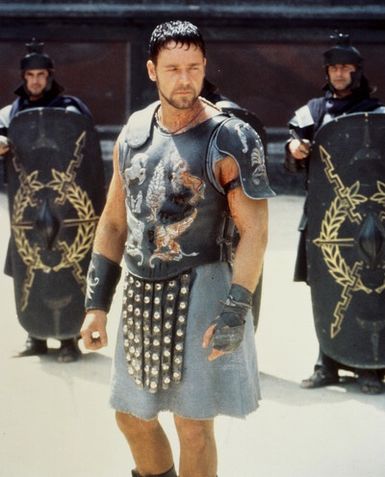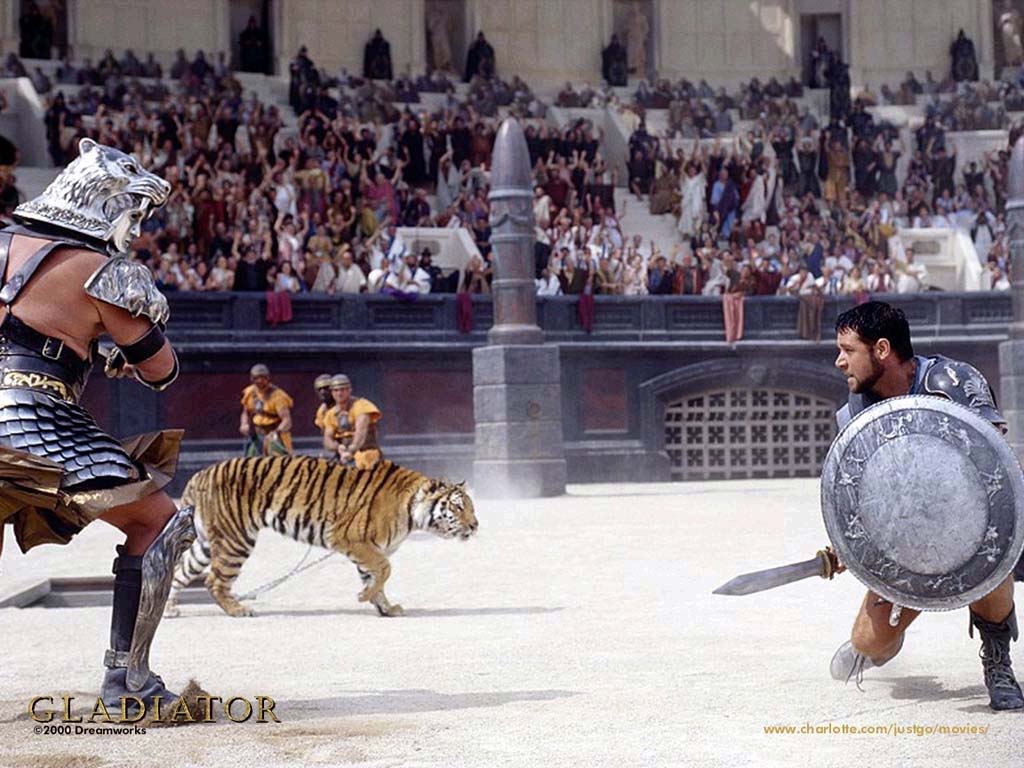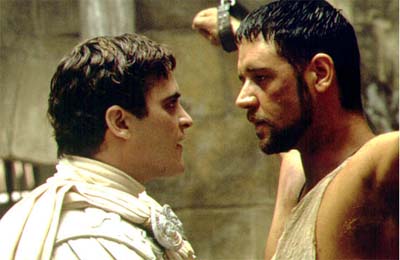Gladiator (2000)
DIRECTOR: Ridley Scott
CAST:
Russell Crowe, Joaquin Phoenix, Connie Nielsen, Djimon Hounsou, Oliver Reed, Richard Harris, Derek Jacobi, Tomas Arana, Tommy Flanagan, Ralf Moeller, David Schofield, Spencer Treat Clark, Sven-Ole Thorsen
REVIEW:
Gladiator is the first sword-and-sandals epic in four decades, and harkens back to epic spectacle on a scale seldom mounted while updating the Roman epic with modern effects (and modern violence). Gladiator is a ferocious epic of sand and blood that might attract both fans of Spartacus and those who appreciated Rob Roy, The Last of the Mohicans, or Braveheart, and combines spectacle, red-blooded action, and narrative prowess into a rousing and dynamic film.
The storyline is simple enough. In 180 AD, Roman General Maximus (Russell Crowe) has just smashed the final German stronghold standing in the way of Roman victory for his beloved, fading Emperor Marcus Aurelius (Richard Harris), who looks on him as a son. Aurelius intends for Maximus to assume his powers upon his death, to safeguard Rome’s transition from Imperial dictatorship back to the Republic it was founded as, but this doesn’t sit well with Aurelius’ son Commodus (Joaquin Phoenix). When he learns of his father’s intentions, Commodus murders the Emperor in a hysterical fit, then sentences Maximus to death when the honorable General refuses to pledge allegiance to him. Making a narrow escape but too late to save his wife and young son, the distraught and exhausted Maximus is picked up by a roving band of slave traders who take him to a remote Roman province, where he and other slaves, including Juba (Amistad’s Djimon Hounsou) and Hagen (former German bodybuilding champion Ralf Moeller) are bought by gladiator trainer Proximo (Oliver Reed in his final role). Forced to slaughter other gladiators to the entertainment of the bloodthirsty audience, Maximus has only one goal: to somehow make his way to Rome to confront Commodus and avenge his family.
While he has already established his acting ability in roles like a vicious neo-Nazi in 1992’s Romper Stomper, a hard-ass cop in 1997’s LA Confidential, and his Oscar-nominated performance as real-life tobacco industry whistleblower Jeffrey Wig and in 1999’s The Insider (requiring him to gain substantial weight and wear age makeup), Gladiator is the movie that removes any doubts that New Zealand-born, Aussie-raised Russell Crowe can move from character actor to major leading man and action hero. Crowe holds the camera’s attention with a smoldering intensity and brawny, ruggedly masculine charisma, making Maximus a hero to stand alongside Mel Gibson’s William Wallace and Liam Neeson’s Rob Roy. He’s commanding in his General scenes, convincingly physical in his many fight scenes, and shows range by being equally convincing in quiet, sympathetic moments as he is when he’s ferociously hacking other gladiators to death in the arena. Like Wallace and Rob Roy, Maximus is compulsively easy to root for because he’s an underdog, he’s a virtuous man who has been terribly wronged, and he’s played by an actor who sells all of it.
and in 1999’s The Insider (requiring him to gain substantial weight and wear age makeup), Gladiator is the movie that removes any doubts that New Zealand-born, Aussie-raised Russell Crowe can move from character actor to major leading man and action hero. Crowe holds the camera’s attention with a smoldering intensity and brawny, ruggedly masculine charisma, making Maximus a hero to stand alongside Mel Gibson’s William Wallace and Liam Neeson’s Rob Roy. He’s commanding in his General scenes, convincingly physical in his many fight scenes, and shows range by being equally convincing in quiet, sympathetic moments as he is when he’s ferociously hacking other gladiators to death in the arena. Like Wallace and Rob Roy, Maximus is compulsively easy to root for because he’s an underdog, he’s a virtuous man who has been terribly wronged, and he’s played by an actor who sells all of it.
Apart from Danish actress Connie Nielsen, exuding a cool regality as the balance beam between the two dramatic poles of Maximus and Commodus, and Amistad‘s Djimon Hounsou as Maximus’ closest comrade in the arena, the supporting cast is mostly made up of elder British thespians including Oliver Reed in his final role (Reed suffered a fatal heart attack during filming, requiring some script tweaks and a couple of his scenes finished with a little editing and special effects trickery) and Derek Jacobi, no stranger to Roman costume dramas (he previously played Emperor Claudius in the 1970s BBC series I, Claudius) as a Senator opposed to Commodus. And Richard Harris is always a welcome presence, even if he’s not around for long. The lone American in the principal cast is Joaquin Phoenix (sporting a pseudo-British “Roman costume drama”-esque accent to fit in), who plays Commodus as a petulant degenerate with megalomaniacal tendencies and an incestuous lust for his sister, but Scott and Phoenix add enough shading that there are moments where it is possible to feel a tinge of pity, if not exactly sympathy. Incidentally, this is not the first time a somewhat fictionalized version of the real-life Emperor Commodus has been a movie villain; that was Christopher Plummer in 1964’s The Fall of the Roman Empire, with which Gladiator shares various plot elements, although both movies take some large liberties with history.
 Despite a running length of two and a half hours, Gladiator seldom drags. The film opens with the largest-scale battle sequence that brings to mind a little of the bloody chaos of Saving Private Ryan, and features a steady string of equally bloody action sequences in the arena. Blood spurts. Bodies get beheaded and cut in half. The crowd roars. Apart from the opening battle, the highlight of the gladiatorial combat pits Maximus against hulking undefeated champion Tigris (Sven-Ole Thorsen), with tigers thrown in to up the ante. Scott takes the time to emphasize how daunting the Colosseum looks when entered for the first time (albeit exaggerating its size a bit for more dramatic effect) and throws in some quiet dialogue scenes between the fighting and bloodletting, but the movie isn’t quite as deft as Spartacus at balancing the epic and the intimate; despite some themes about the power that comes from “winning the crowd”, and some backstage political machinations that feel a little half-developed, one can tell Maximus’ struggle is where the movie’s energy and momentum really lies. While similar political intrigue scenes in Spartacus were as important as the meeting between liberty and tyranny on the battlefield, Gladiator starts to itch to get back to the arena after being away for too long. It doesn’t help that the movie’s “talky” scenes are sometimes handled in heavy-handed fashion; Commodus is prone to melodramatic monologues, and Derek Jacobi gets to utter lines like “the beating heart of Rome is not the marble of the Senate, but the sand of the Colosseum” (in Jacobi’s mouth, it sounds practically Shakespearean). Ancient Rome is impressively reconstructed through elaborate sets, but some wide shots have an overly CGI look to them, like a 2000s version of the background matte paintings in movies like Spartacus.
Despite a running length of two and a half hours, Gladiator seldom drags. The film opens with the largest-scale battle sequence that brings to mind a little of the bloody chaos of Saving Private Ryan, and features a steady string of equally bloody action sequences in the arena. Blood spurts. Bodies get beheaded and cut in half. The crowd roars. Apart from the opening battle, the highlight of the gladiatorial combat pits Maximus against hulking undefeated champion Tigris (Sven-Ole Thorsen), with tigers thrown in to up the ante. Scott takes the time to emphasize how daunting the Colosseum looks when entered for the first time (albeit exaggerating its size a bit for more dramatic effect) and throws in some quiet dialogue scenes between the fighting and bloodletting, but the movie isn’t quite as deft as Spartacus at balancing the epic and the intimate; despite some themes about the power that comes from “winning the crowd”, and some backstage political machinations that feel a little half-developed, one can tell Maximus’ struggle is where the movie’s energy and momentum really lies. While similar political intrigue scenes in Spartacus were as important as the meeting between liberty and tyranny on the battlefield, Gladiator starts to itch to get back to the arena after being away for too long. It doesn’t help that the movie’s “talky” scenes are sometimes handled in heavy-handed fashion; Commodus is prone to melodramatic monologues, and Derek Jacobi gets to utter lines like “the beating heart of Rome is not the marble of the Senate, but the sand of the Colosseum” (in Jacobi’s mouth, it sounds practically Shakespearean). Ancient Rome is impressively reconstructed through elaborate sets, but some wide shots have an overly CGI look to them, like a 2000s version of the background matte paintings in movies like Spartacus.
But if Gladiator isn’t quite flawless, it’s a worthy modernized successor to the likes of Spartacus, and by any cinematic standard, it’s a rousing epic adventure that’s more character-oriented and narratively solid than it had to be, and ultimately just about as crowd-pleasing as Maximus himself.
***1/2
